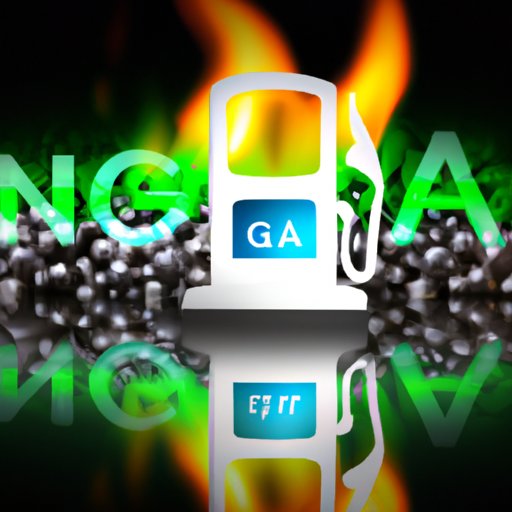Introduction
Gas, or gasoline, is a petroleum-based fuel that powers millions of vehicles around the world. It’s a complex chemical mixture composed of hundreds of different compounds, and understanding how it works can help drivers make informed decisions about their fuel choices and car maintenance. In this article, we’ll explore the chemistry of gasoline, how engines use it to power a vehicle, the refining and distribution process, octane ratings, alternative fuels, and the environmental impact of burning gasoline.

Exploring the Chemistry of Gasoline
Gasoline is a complex mixture of hydrocarbons, which are molecules made up of hydrogen and carbon atoms. The most common components of gasoline are octane, ethane, propane, butane, and pentane, though there are dozens of other compounds present in smaller amounts. These hydrocarbons are refined from crude oil, and each one has a different boiling point and energy content.
The hydrocarbons in gasoline have different properties that affect how well the fuel burns. For example, octane is the most stable of the hydrocarbons, meaning it has the highest resistance to pre-ignition, which can cause engine knocking. Ethane and propane have higher energy content than octane, but they burn more quickly, which can lead to increased engine wear and reduced efficiency.

How Engines Use Gas to Power a Vehicle
When gasoline is used to power an engine, it first needs to be vaporized so that it can be combusted. This is done by the fuel injectors, which spray tiny droplets of fuel into the combustion chamber. When the spark plugs ignite the fuel-air mixture, the resulting explosion forces the pistons down and turns the crankshaft, which then powers the wheels of the vehicle.
The spark plugs and oxygen sensors play an important role in this process. The spark plugs provide the spark needed to ignite the fuel-air mixture, while the oxygen sensors measure the amount of oxygen in the exhaust gases and adjust the fuel-air mixture accordingly. This helps ensure that the engine is running efficiently and producing minimal emissions.
How Gasoline is Refined and Distributed
Gasoline is refined from crude oil through a process known as fractional distillation. This involves heating the crude oil until it vaporizes, then separating the various components based on their boiling points. The resulting gasoline is then blended with other chemicals such as detergents, antiknock agents, and corrosion inhibitors to improve its performance and meet industry standards.
Once the gasoline is refined, it is transported to gas stations via pipelines, tankers, and trucks. Oil companies also have quality assurance protocols in place to ensure that the fuel meets their standards. This includes regular testing for contaminants and additives to ensure that the fuel is safe and effective.
Understanding Octane Ratings
Octane ratings are a measure of a gasoline’s ability to resist pre-ignition, which can cause engine knocking. Higher octane fuel is less prone to pre-ignition, which makes it better suited for high-performance engines. Lower octane fuel is cheaper, but it can cause engine damage if used in a high-performance engine.
It’s important to understand your vehicle’s requirements when choosing a fuel. Most cars require 87 octane fuel, but some high-performance vehicles may require higher octane fuel. Using the wrong octane fuel can reduce engine performance, increase fuel consumption, and cause engine damage.

The Benefits of Alternative Fuels
Alternative fuels are becoming increasingly popular as concerns about air pollution and global warming grow. These fuels include biodiesel, ethanol, electricity, and natural gas, and each has its own advantages and disadvantages. Biodiesel, for example, is made from vegetable oils and emits fewer pollutants than gasoline, but it’s more expensive and harder to find.
Ethanol is another popular alternative fuel, made from corn or sugarcane. It produces fewer pollutants than gasoline, but it’s less energy dense, meaning it takes more fuel to travel the same distance. Electric vehicles are becoming increasingly popular due to their zero emissions and low running costs, but they still lack the range and convenience of gasoline-powered vehicles.
The Environmental Impact of Gasoline Usage
Burning gasoline releases pollutants into the air, including nitrogen oxides, carbon monoxide, and particulate matter. These pollutants can cause health problems such as respiratory illnesses and heart disease, and they contribute to smog and acid rain. Burning gasoline also releases greenhouse gases, which are responsible for global warming.
To reduce the environmental impact of gasoline usage, governments are encouraging the use of alternative fuels and cleaner burning technologies. Hybrid and electric vehicles are becoming increasingly popular, and new fuel formulations such as biofuels are being developed to reduce emissions. Governments are also introducing stricter regulations on emissions from vehicles.
Conclusion
Gasoline is a complex fuel used in millions of vehicles around the world. Understanding how it works can help drivers make informed decisions about their fuel choices and car maintenance. We’ve explored the chemistry of gasoline, how engines use it to power a vehicle, the refining and distribution process, octane ratings, alternative fuels, and the environmental impact of burning gasoline.
Gasoline is an important fuel that powers many of our vehicles, but it’s not without its drawbacks. Drivers should be aware of the environmental impacts of burning gasoline, as well as the benefits of alternative fuels. By understanding how gas works, we can make more informed decisions about how we use it.
(Note: Is this article not meeting your expectations? Do you have knowledge or insights to share? Unlock new opportunities and expand your reach by joining our authors team. Click Registration to join us and share your expertise with our readers.)
